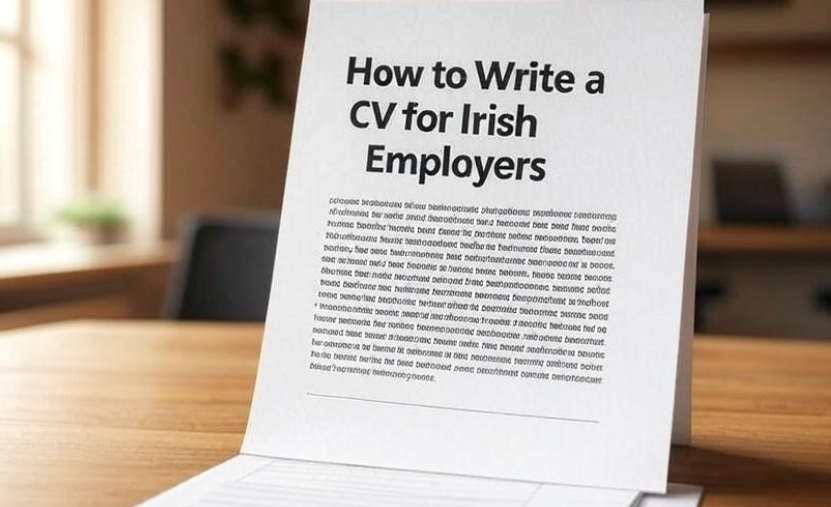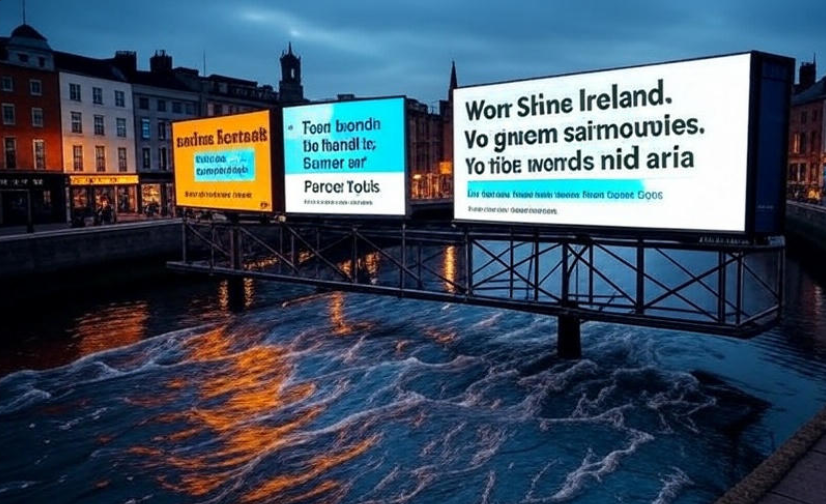Finding a job in Ireland can feel exciting, but also a little confusing if you are not sure how to prepare your CV. A CV (Curriculum Vitae) is more than just a piece of paper – it is your first impression. Employers in Ireland often receive hundreds of applications, so your CV needs to stand out in a clear, professional, and simple way.
In this guide, I will explain how you can create a CV that matches what Irish employers are actually looking for. I’ll keep things very practical so you can use this as a step-by-step reference.
Understand the Irish CV style
Irish employers usually prefer a CV that is 2 pages long. Unlike some countries where long CVs are acceptable, in Ireland, recruiters like short and focused ones.
Your CV should not look crowded. Keep your sentences short, use bullet points where possible, and highlight only the most important achievements.
Personal details – what to include and what to avoid
Start with your name, phone number, email, and location (city/town is enough). Irish employers do not usually need your full address, marital status, or date of birth.
Here’s a quick comparison:
| Detail | Should You Include? | Notes |
|---|---|---|
| Full Name | ✅ Yes | Use the same name as in official documents. |
| Phone Number | ✅ Yes | Add country code if applying from outside Ireland (+353). |
| ✅ Yes | Use a professional email address, not nicknames. | |
| Full Address | ❌ No | Just write city, e.g., “Dublin”. |
| Date of Birth | ❌ No | Not needed. |
| Photo | ❌ Usually no | Unless asked in specific sectors. |
Write a short personal profile
At the top of your CV, write 3–4 lines about yourself. This is not your life story, but a quick summary of your skills and career goals.
For example:
“Hardworking IT graduate with strong problem-solving skills and experience in software support. Looking to grow in a dynamic Irish company where I can contribute to technology solutions.”
This section helps the employer understand your personality in a few seconds.
Education section
List your education in reverse order – the most recent first. Include the degree name, institution, and year of completion. If you have high grades or awards, mention them.
Example:
-
Bachelor of Computer Science – University of Galway – 2023
-
Leaving Certificate – Cork – 2019
Tip: If you are applying for entry-level roles, education can come before work experience. But if you already have several years of work experience, then put experience first.
Work experience – make it achievement-focused
Irish employers value results more than just duties. Instead of writing “responsible for customer calls”, try writing:
✅ “Handled 50+ customer support calls daily and resolved issues with a 90% satisfaction rate.”
This shows proof of your ability.
Here’s how you can structure your work experience:
-
Job Title – Company – Dates
-
Bullet points with 3–4 main achievements
-
Keep each point short and powerful
Example:
Sales Assistant – Tesco Dublin – June 2021 to August 2023
-
Increased weekly sales by promoting new products to customers
-
Managed stock and reduced missing items by 15%
-
Trained two new employees in customer service
Skills section
Add a section with key skills, but avoid just writing “hardworking” or “team player”. Instead, focus on specific, job-relevant skills.
Examples:
-
Microsoft Excel and Data Analysis
-
Customer Service Communication
-
Bilingual: English and Spanish
-
Project Management Tools (Trello, Asana)
Keep language clear and simple
One mistake many job seekers make is using too much complicated language. Irish employers like CVs that are easy to read quickly. Avoid jargon or overlong sentences.
Instead of saying:
“Utilized comprehensive interpersonal strategies to optimize client interaction outcomes”
Just say:
“Built strong relationships with clients and improved customer satisfaction.”

Tailor your CV for every job
This is very important: do not send the same CV to every employer.
Look at the job description, underline the keywords, and make sure your CV reflects those words. For example, if the job asks for “team leadership” and “time management”, make sure these appear in your CV (but naturally, not forced).
Formatting matters
-
Use Arial or Calibri font, size 11 or 12
-
Keep enough white space (don’t squeeze text)
-
Use clear section headings (bold is enough, no need for fancy design)
-
Save as PDF before sending
Good formatting shows you are professional and organized.
Common mistakes to avoid
❌ Spelling errors – double check before sending
❌ Adding too much personal info (religion, photo, age)
❌ Using the same CV for all jobs
❌ Making it too long (over 3 pages)
❌ Writing duties only, no achievements
Extra sections you may add
-
Certifications (like IT, First Aid, Language courses)
-
Volunteer work (especially valued in Ireland, shows character)
-
Interests (optional, but can make you memorable if relevant, e.g., “Member of coding club”)
Sample CV layout for Ireland
| Section | Content Example |
|---|---|
| Name & Contact | John Murphy, Dublin, +353 8X XXX XXXX, john.murphy@email.com |
| Profile | Motivated Business Graduate with strong communication and sales skills. |
| Education | Bachelor of Business – Trinity College Dublin – 2022 |
| Work Experience | Sales Assistant – SuperValu – 2021–2023: Increased customer retention by 10%. |
| Skills | MS Office, Negotiation, Customer Service, Problem Solving |
| Extras | Volunteer – Irish Cancer Society, 2021 |
Final CV checklist before sending 📋
-
Is my CV only 2 pages?
-
Did I remove unnecessary details (photo, DOB, full address)?
-
Does each job show achievements, not just duties?
-
Is my grammar and spelling correct?
-
Did I tailor it for this specific job?
If you tick all these, your CV is ready to go! ✅
FAQs about CVs in Ireland
Q: Do Irish employers prefer CV or Resume?
A: In Ireland, the term CV is used, but it is similar to a resume. Keep it short (2 pages max).
Q: Should I include references?
A: You can write “References available on request”. Employers usually ask later.
Q: Is a photo required?
A: No, unless you are applying for roles like acting or modeling.
Q: Can I use Europass CV format?
A: You can, but Irish employers often prefer a simpler, custom format.
Q: Should I write cover letters too?
A: Yes, most Irish employers expect a short, tailored cover letter with your CV.
Final thoughts
Writing a CV for Irish employers is about being clear, short, and relevant. Think of your CV as your personal marketing brochure – it needs to sell your skills quickly. If you highlight your achievements, keep the design simple, and tailor it to the job, you will already be ahead of many other applicants.
And remember, your CV is not a one-time document. Update it regularly as you gain new skills and experience. That way, when the perfect Irish job comes up, you are ready to apply immediately.




